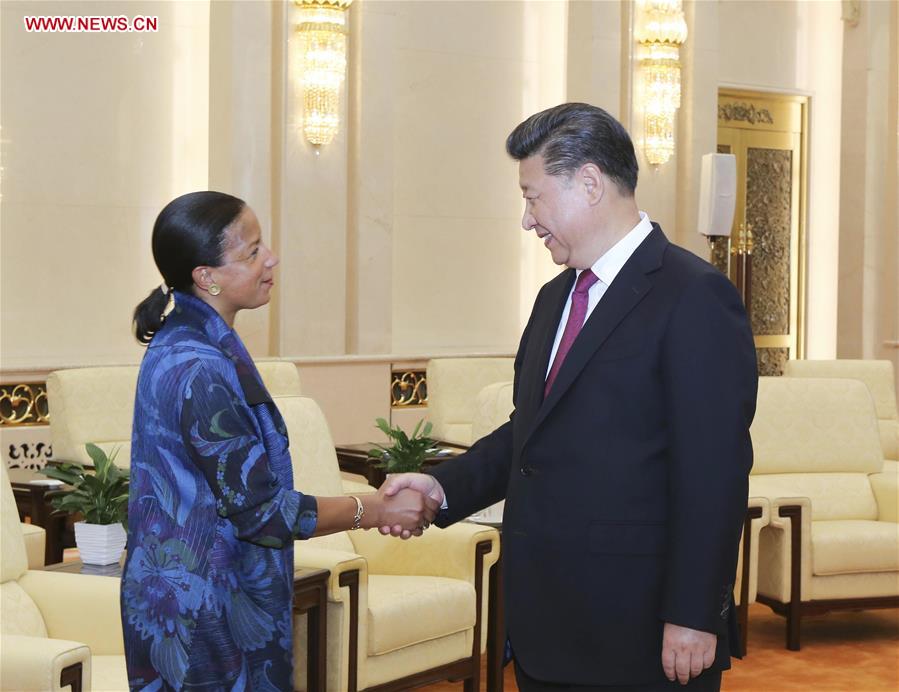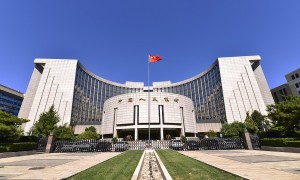习近平:中美要相互尊重彼此的核心利益
7月25日,北京(新华)—周一,习近平主席呼吁中美双方有效管控分歧,相互尊重彼此的核心利益。
BEIJING, July 25 (Xinhua) -- President Xi Jinping on Monday called on China and the United States to effectively manage their differences and respect each other's core interests.

Chinese President Xi Jinping (R) meets with U.S. National Security Advisor Susan Rice at the great Hall of the People in Beijing, capital of China, July 25, 2016. (Xinhua/Ding Lin)
Xi made the remarks when meeting with U.S. National Security Advisor Susan Rice at the Great Hall of the People in Beijing.
China-U.S. common interests outweigh their differences, Xi said, noting that both sides needed more mutual trust and cooperation.
The goal of China's development is to benefit its 1.3 billion people, Xi said, reiterating that China had no intention of challenging the present international rules and order, and it will never seek hegemony.
Xi called on both sides to expand economic, trade and investment cooperation, as well as cooperation in climate change and international and regional affairs to make pragmatic cooperation a "ballast" in China-U.S. ties.
Rice said the United States agreed to work with China to strengthen mutual trust, enhance pragmatic cooperation and manage issues of difference through close communication.
Xi recalled his meetings with U.S. President Barack Obama over the past three years and the consensuses agreed upon.
The decision of the two sides to build a new model of major-country relations has produced many solid achievements in bilateral relations, Xi said.
Sino-U.S. relations should always stick to the principle of no-conflict, no-confrontation, mutual respect, and win-win cooperation, according to Xi.
China values ties with the United States and is willing to make joint efforts to make sure the relationship enjoys sustainable, steady growth, Xi said.
Rice said the U.S. side viewed its relationship with China as its most consequential ties today and China's success is in line with America's interest.
She called for more cooperation to deal with global challenges such as climate change.
This year's G20 summit will be held in east China's Hangzhou City in September.
Xi said he was looking forward to meeting with President Obama in Hangzhou in September, expressing his hope that the meeting will boost bilateral ties and direct the stable development of bilateral ties.
Xi called on China and the United States, as the world's two biggest economies, to work together and make the summit a success, which will send a signal of confidence to the world and inject new vitality into the global economy.
Rice said President Obama was also looking forward to the G20 summit and the meeting with Xi.
When meeting with Rice on Monday, Vice Chairman of China's Central Military Commission Fan Changlong and Chinese State Councilor Yang Jiechi reiterated China's position on the South China Sea issue and the deployment of Terminal High Altitude Area Defense (THAAD) in the Republic of Korea (ROK).
On July 12, the Arbitral Tribunal for the South China Sea arbitration issued its so-called award, which attempts to deny China's territorial sovereignty and maritime rights and interests in the South China Sea.
China will continue to firmly safeguard its territorial sovereignty and maritime rights and interests in the South China Sea, Yang said, noting that China opposes the award of the so-called arbitral tribunal in the South China Sea Arbitration.
China's stance on the South China Sea issue is unshakable, Fan said, affirming China's staunch position of non-acceptance and non-recognition of the award.
Fan said the Chinese military would continue to provide strong backing to safeguarding China's national territorial sovereignty and security.
In mid July, the ROK's defense ministry announced an agreement with the United States to deploy the U.S. missile defense system, THAAD, to its southeastern region despite opposition from neighboring countries.
Fan said the THAAD deployment would directly damage China's strategic security, escalate the tension in the Korean Peninsula and undermine China-U.S. mutual trust.
Yang urged the U.S. side to take China's concern seriously and to halt the deployment of the U.S. anti-missile system in the ROK.
Rice said the United States was ready to work with China to properly manage and control differences to avoid misunderstanding or miscalculation.
Rice is visiting China from July 24 to 27.







